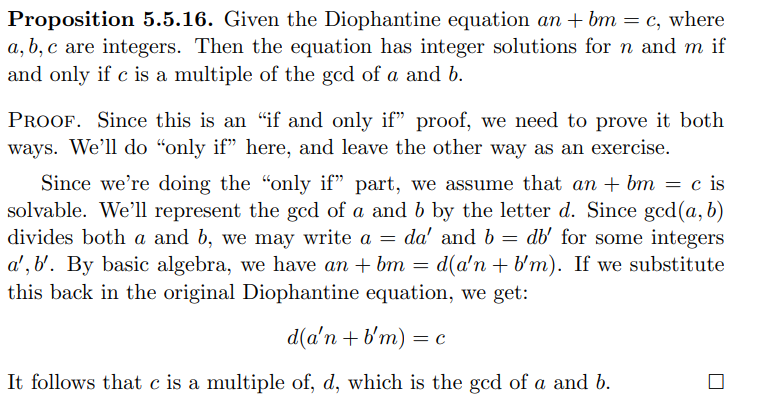Proposition 5.5.20. Given a modular equation ax = c (mod b), where a,b, c are integers. Then the equation has an integer solution for x if and only if c is an integer multiple of the greatest common divisor of a and b.
Proposition 5.5.20. Given a modular equation ax = c (mod b), where a,b, c are integers. Then the equation has an integer solution for x if and only if c is an integer multiple of the greatest common divisor of a and b.
Algebra & Trigonometry with Analytic Geometry
13th Edition
ISBN:9781133382119
Author:Swokowski
Publisher:Swokowski
Chapter1: Fundamental Concepts Of Algebra
Section1.2: Exponents And Radicals
Problem 90E
Related questions
Question
Please do Question 5.5.21 and the hint is to use Proposition 5.5.16. Please show everything and explain each step.

Transcribed Image Text:Proposition 5.5.16. Given the Diophantine equation an + bm = c, where
a, b, c are integers. Then the equation has integer solutions for n and m if
and only if c is a multiple of the gcd of a and b.
PROOF. Since this is an "if and only if" proof, we need to prove it both
ways. We'll do “only if" here, and leave the other way as an exercise.
Since we're doing the "only if" part, we assume that an + bm = c is
solvable. We'll represent the gcd of a and b by the letter d. Since gcd(a, b)
divides both a and b, we may write a
a', b'. By basic algebra, we have an + bm =
this back in the original Diophantine equation, we get:
da' and b = db' for some integers
d(a'n + b'm). If we substitute
d(a'n + b'm) =
It follows that c is a multiple of, d, which is the gcd of a and b.

Transcribed Image Text:Proposition 5.5.20. Given a modular equation ax = c (mod b), where
a, b, c are integers. Then the equation has an integer solution for x if and
only if c is an integer multiple of the greatest common divisor of a and b.
Exercise 5.5.21. Prove both the "if" and the "only if" parts of Proposi-
tion 5.5.20. (*Hint*)
Expert Solution
This question has been solved!
Explore an expertly crafted, step-by-step solution for a thorough understanding of key concepts.
Step by step
Solved in 2 steps

Recommended textbooks for you

Algebra & Trigonometry with Analytic Geometry
Algebra
ISBN:
9781133382119
Author:
Swokowski
Publisher:
Cengage

Elements Of Modern Algebra
Algebra
ISBN:
9781285463230
Author:
Gilbert, Linda, Jimmie
Publisher:
Cengage Learning,


Algebra & Trigonometry with Analytic Geometry
Algebra
ISBN:
9781133382119
Author:
Swokowski
Publisher:
Cengage

Elements Of Modern Algebra
Algebra
ISBN:
9781285463230
Author:
Gilbert, Linda, Jimmie
Publisher:
Cengage Learning,
